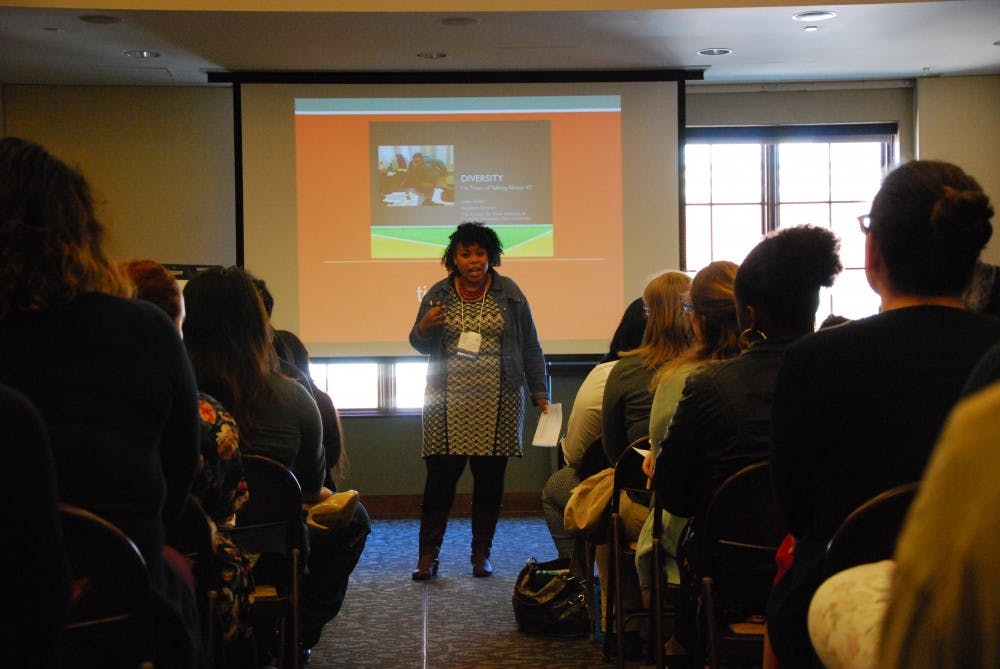"We need to interact with speaking, telling and sharing by listening."
With that message, Senior Lecturer in English and keynote speaker Paula Patch kicked off day two of Elon University's Intersect Diversity and Leadership Conference Saturday. She shared her experiences listening to the sounds of hawks — which she said are surprisingly soft given the hawk's reputation of intimidating physical power — as a way to encourage attendees to listen to those around them with curiosity.
"It's the ideas we softly but repeatedly sing," she said. "Listen for the small sound of something big."
Patch's lesson of listening, of learning to invite people to tell their truths and to truly engage with what they have to say, resonated through the ensuing round table discussions. More than 250 attendees from 13 universities around North Carolina and the surrounding states spent an hour in small groups sharing their perspectives and experiences about a variety of topics, ranging from racial bias on college campuses to the recent Starbucks holiday cup controversy.
Karina Gonzalez, a sophomore at Salem College in Winston-Salem who sat at a table discussing cultural appropriation, said Patch's lesson translated directly to the respect for ideas she saw at her table.
"I think that everyone was willing to listen to everyone else's perspectives with an open mind," she said. "I remember her saying something like, 'If you're not willing to listen with the openness to change your mind, then you're not really listening.' I think everyone exercised that really well, which was really awesome, since people can be closed-minded about these topics."
Gonzalez also saw that open-mindedness and willingness to engage with one another in the other sessions she attended. She said she noticed a different kind of openness in "Learning Through Doing: Activities for Engaging with Social Justice," led by Assistant Director of the Kernodle Center for Student Programs Evan Small.
"[The participants] were open in the sense of being open with how you represent yourself to people in the room and where you're standing," she said.
Small's session engaged participants in experiential learning activities and taught them how to facilitate difficult discussions through those activities. His session and many others, as well as the round table discussions, focused on teaching conference attendees how to facilitate difficult discussions.
Jamie Butler, assistant director for the Center for Race, Ethnicity, and Diversity Education, facilitated one such difficult discussion, called, "Is Your Truth Honest?" She expressed her frustration at the circular nature of current conversations about bias.
"We just talk, but we don't really discuss," she said. "How do we move forward after learning what our biases are?"
Butler asked her attendees to confront their own biases so they can move forward. In one activity, Butler posted a list of 14 categories, such as "Latina," "police officers" and "men," then asked each attendee to write down the first three words that came to mind when they saw each word. Several attendees afterward said they were "ashamed" of their first thoughts, which Butler responded to by challenging them to keep that conversation going.
"We need to have an internal dialogue with ourselves about what our personal biases are," she said. "Go into these conversations with your truths, not just with what you think people want to hear. Go with your truths, and go with your honesty."
The difficult discussions and lessons of the day culminated in a nontraditional keynote address by Clint Smith, a teacher, poet and doctoral candidate at Harvard University. Earlier in the day, Smith led a session about truth-telling through written reflection, during which he led attendees in writing letters to their former selves to address an unpleasant truth.
For his keynote address, Smith performed eight spoken word poems interspersed with introductions and explanations. He discussed his background, including his relationship with his father and the students he teaches as an urban educator. Smith demonstrated the same willingness to tackle difficult conversations discussed in most of Saturday's sessions and encouraged conference attendees to do the same.
"A lot of people are simply naive to the way other people experience the world," he said. "I think it's important to engage people who just don't know."
Further, though, echoing Senior Lecturer in Religious Studies L.D. Russell's Friday keynote address, Smith called listeners to apply the lessons of the two days and the results of the conference's difficult discussions to current events.
"I've been moved and inspired by the cultural competency of students at [the University of] Missouri and Yale [University]," he said. "I think people are recognizing they have agency. You can demand something different than the world as it is."


